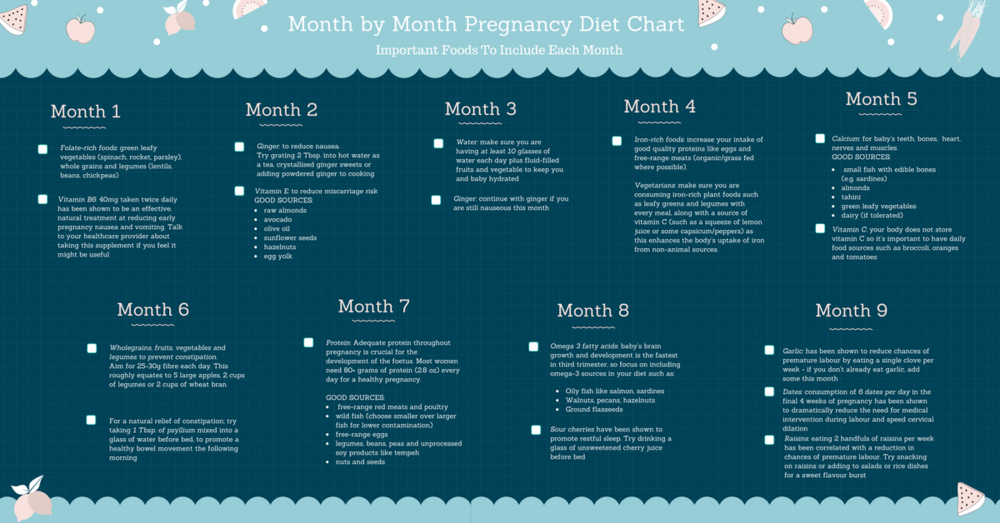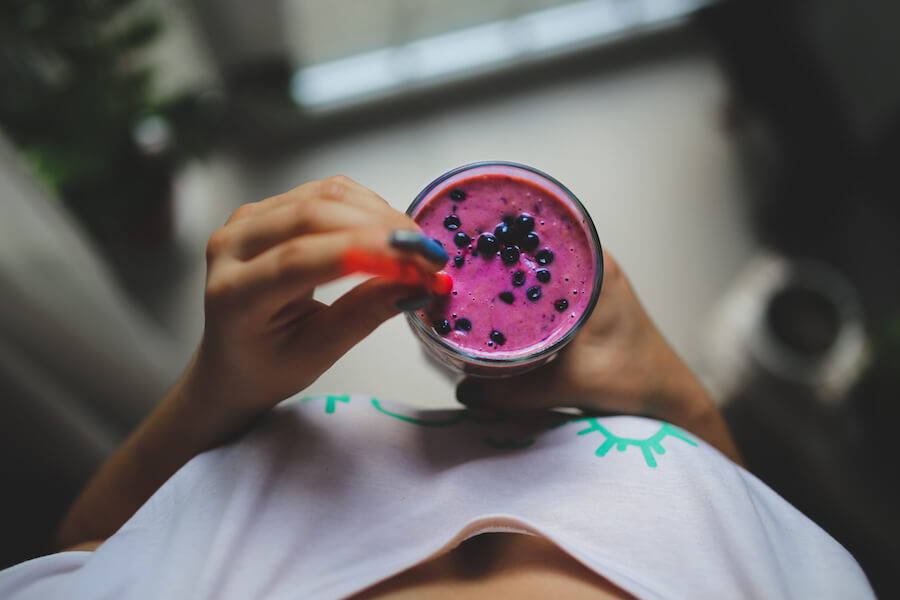The Complete Month By Month Pregnancy Nutrition Guide

Pregnancy Diet Guide
Pregnant with PCOS? Firstly - well done to you!
Secondly, make sure you check out my best selling PCOS book the PCOS Repair Protocol to learn more about eating to support your condition AND your baby.
So, you’ve found out you’re pregnant – congratulations! After getting over the initial excitement and shock, you are probably wondering what you can do to support this new life.
Doctors may have warned you about foods to avoid, not to drink alcohol and to reduce caffeine, but so far, my guess is no one has told you what you should be eating.
Much of the preparation for pregnancy and birth is focused on avoiding risks, but did you know that the way you eat throughout pregnancy can boost your baby’s IQ, lower their future disease and obesity risk, make birth easier and less painful and help you recover faster post-birth?
Read on to find out how to give your baby the best start in life.
Why Should I Eat Well During Pregnancy?
Optimal nutrition throughout pregnancy is crucial for growing a healthy baby, minimizing complications, and also beyond birth. Studies have shown that a healthy diet during pregnancy can reduce the chances of your baby developing obesity, diabetes and heart disease later in life.
Eating well and taking certain probiotics throughout your pregnancy can also dramatically reduce the chances of your baby developing asthma, eczema and hay fever after they are born (more on this later).
This month by month pregnancy diet guide and chart gives you key foods to focus on for baby’s development each month, along with common physical symptoms experienced at this time, and nutritional and lifestyle strategies to manage these.
Before jumping in to each specific month, let’s have a look at some general guidelines for healthy eating throughout your whole pregnancy.
What Should I Eat During Pregnancy?
GENERAL GUIDELINES FOR EATING THROUGHOUT ENTIRE PREGNANCY
Focus on nutrient dense whole-foods: this means minimally processed and as close to the natural form as possible. When buying packaged foods – a good rule of thumb is if there are ingredients on the packet you don’t recognise – don’t buy it.
Good quality protein: most women require around 80 grams (2.8 oz.) of protein during pregnancy. Good quality proteins are minimally processed and from high quality sources e.g. grass fed/free range/organic where possible. To calculate your estimated protein requirement, times your pre-pregnancy weight by 1.2 - this is the amount in grams suggested to eat daily. (E.g. 65 kg woman requires ~78g protein per day).
Adequate healthy fats: contrary to much of the now outdated government advice to reduce fats, modern research is demonstrating the importance of healthy fats for all body systems. During pregnancy, adequate fat intake is crucial for the development of baby’s organs and brain. Healthy sources of fats include: olive oil, avocado, nuts and seeds, eggs, oily fish, meats (if you choose to consume them).
An abundance of fresh vegetables and fruit: fruit and veg are full of vitamins, minerals and fibre. Eating a wide variety of fruit and veg will act as a cover-all in providing your body with many of the nutrients it needs, as well as plenty of fibre to avoid constipation. Focus on including plenty of leafy green vegetables (spinach, kale, collard greens, parsley etc) for a good quality source of folate.
At least 10 cups of fluid a day. As blood volume increases rapidly during pregnancy, adequate water levels are crucial for replenishing baby’s amniotic fluid and can prevent morning sickness and constipation. Ideally, most of this fluid comes from water, herbal tea and occasionally juices. Stay away from soda/soft drinks, alcohol and high intake of tea and coffee.
Steer clear of processed/packaged/high sugar foods: processed foods offer very little nutrition and often contain chemicals which can be harmful to you and your baby. Don’t waste space with low nutrient foods – crowd them out with nutritious, satisfying wholefoods and you won’t feel deprived.
Moderate levels of grains/starch: when eating grains, go for whole-grains such as brown rice, whole oats, quinoa or whole-grain pasta. Nutrient dense starches include sweet potato, pumpkin, parsnip and beetroot. High consumption of carbohydrates (particularly refined carbs and sugars) during pregnancy can imbalance blood sugar levels and contribute to gestational diabetes, so aim to include moderate serves each meal. To make your grains more digestible and higher in available nutrients, read this article about soaking grains.
Do I Need To Take Supplements When I’m Pregnant?
SUPPLEMENTS WORTH CONSIDERING DURING PREGNANCY:
This is a general guide – please talk to your health care provider before beginning any of the suggested supplements.
Inositol - Particularly for women with PCOS and insulin resistance, supplementing inositol can be a safe replacement for Metformin during pregnancy.
High quality pregnancy multivitamin that contains at least 400 mcg folic acid (to help prevent neural tube defects) - this supplement is most important in the very early stages of pregnancy as the spinal cord is developed 4 weeks after conception.
It is important to start as soon as you know you are pregnant, or ideally before you start trying to conceive. If you know you have an MTHFR gene mutation (which is responsible for the conversion of folic acid to other compounds required by the body), you may benefit from supplementing folinic acid and/or 5-MTHF instead.
Lactobacillus Rhamnosus probiotic. If both parents have a history of eczema, the chances of their baby developing eczema is around 60-80%.
Probiotics containing lactobacillus strains have been shown to reduce the chances of the child developing allergies by almost 80%.
One of the most studied strains: lactobacillus rhamnosus has been shown that when taken in the final trimester of pregnancy (and in some cases postnatally as well), it greatly reduces the chances of the baby developing atopy (asthma, eczema, hay fever). If you or your partner have a history of allergies, talk to your health care provider about whether this probiotic might be helpful for you.
Magnesium is essential for foetal bone and teeth development and can prevent premature contraction of the uterus. It’s also a great supplement to take throughout pregnancy as it helps muscles to relax, so can help with constipation, assist your tissue growth and promote restful sleep.
Fish oil/omega 3’s are essential for neurological and visual development in your baby, and in the production of breast milk.
Studies have shown that supplementing with omega 3 during pregnancy can increase the cognitive development of your baby and boost future IQ. Other studies have also shown that a higher intake of omega 3’s may decrease the risk of allergy development in the baby.
Furthermore, omega 3’s have been shown to reduce premature labour, lower the risk of preeclampsia and mother’s risk of depression.
Talk to your doctor about whether an omega 3 supplement may be beneficial for you but please note – quality of these supplements varies widely.
Choose brands that have proven purity and appropriate storage – not the cheap brand off your chemist’s shelf.
How Should I Eat In Each Month of Pregnancy?
Month By Month Pregnancy Diet Chart
Print the following chart (right click the image to open in a new window and print from there) and follow along each month of your pregnancy for the most important foods to focus on that month. Read on to learn more about each specific month of pregnancy: what physical symptoms to expect and how to overcome them, your baby’s month-by-month development, and key foods to focus on in each month and trimester.

FIRST TRIMESTER
Month 1 Pregnancy Diet
BABY’S DEVELOPMENT:
In the first month of pregnancy your baby is an embryo consisting of two layers of cells. All the organs and body parts will develop from here. This month, the neural tube is developed which is the reason a supplement containing folic acid (or folinic acid or 5-MTHF if you know that you have an MTHFR gene mutation) is crucial to prevent neural tube defects.
YOUR PHYSICAL SYMPTOMS:
Morning sickness is common in the first few months of pregnancy. It is not experienced by all women, but can be extremely severe for some. The good news is that most women find their nausea disappears by the beginning of their second trimester. In the meantime, here are some strategies to decrease nausea (which can occur at any time of the day, not just in the morning):
- Have a carbohydrate-rich snack 15-20 minutes before you get out of bed in the morning – this can help to settle the stomach before you start to move about. Try storing some plain crackers or bread by your bed for when you wake up
- Consume smaller meals, more frequently (i.e. 6 meals a day, rather than 3). Don’t let yourself get too hungry between meals
- Focus on foods that are easy to digest
- Try to consume liquids between meals rather than with food
- Stay away from high fat, fried and spicy foods as these can aggravate nausea
- Sip plain soda water throughout the day when you feel nauseous
IMPORTANT FOODS TO FOCUS ON IN MONTH 1 OF PREGNANCY:
- Folate-rich foods: green leafy vegetables (spinach, rocket, parsley), whole-grains and legumes (lentils, beans, chickpeas)
- Vitamin B6: 40 mg taken twice daily has been shown to be an effective, natural treatment at reducing early pregnancy nausea and vomiting. Talk to your healthcare provider about taking this supplement if you feel it might be useful

FOODS TO AVOID DURING PREGNANCY:
- Raw/undercooked meats
- Cold cuts of cured meat
- Raw fish (sashimi/sushi)
- Soft cheeses
- Salad bars
- Raw eggs (and foods that contain them e.g. mayonnaise and raw cake batter)
- Unwashed fruit and veg
- High levels of caffeine (coffee, black tea)
Month 2 Pregnancy Diet
BABY’S DEVELOPMENT:
In the second month of pregnancy your baby is around the size of a kidney bean and has distinct, slightly webbed fingers.
YOUR PHYSICAL SYMPTOMS:
Nausea and fatigue are common in the second month. Have a read of this article for some natural remedies for morning sickness.
Need your partner to understand what you’re going through? Get him to read this funny male perspective on nausea.
IMPORTANT FOODS TO EAT IN MONTH 2 OF PREGNANCY:
- Ginger for nausea: ginger has been demonstrated to provide the same relief from nausea as the leading anti-nausea drugs. Try grating 2 Tbsp. into hot water as a tea, chewing on crystallised ginger sweets throughout the day or adding powdered ginger to cooking
-
Vitamin E: this study demonstrated a link between low vitamin E status and increased miscarriage risk
Some good sources of vitamin E include:
1. raw almonds
2. avocado
3. olive oil
4. sunflower seeds
5. hazelnuts
6. egg yolk

Month 3 Pregnancy Diet
BABY’S DEVELOPMENT:
In the third month of pregnancy, your baby is around 7 to 8 cm (3 inches) long and weighs the same as a pea pod.
Tiny, unique fingerprints are now distinct.
YOUR PHYSICAL SYMPTOMS:
Nausea usually starts to disappear at the end of this month.
To get you through, have a read of this cute article on one women’s experience on debilitating morning sickness and the lessons she learned along the way.
IMPORTANT FOODS TO FOCUS ON IN MONTH 3 OF PREGNANCY:
- Make sure you are having at least 10 glasses of water each day plus fluid-filled fruits and vegetables to keep you and baby hydrated
Month 4 Pregnancy Diet
BABY’S DEVELOPMENT:
Welcome to your second trimester! In the fourth month of pregnancy, your baby is around 13 cm (5.5 inches) long and weighs 140g (5oz).
The skeleton is starting to harden from rubbery cartilage into bone. Your baby bump will usually begin to show this month.
YOUR PHYSICAL SYMPTOMS:

IMPORTANT FOODS TO INCLUDE IN YOUR DIET IN MONTH 4 OF PREGNANCY:
- Iron-rich foods: your blood volume is rapidly increasing (and will increase by 50% by the time you give birth). Increase your intake of good quality proteins like eggs and free-range meats (organic/grass fed where possible). If you are vegetarian, make sure you are consuming iron-rich plant foods such as leafy greens and legumes with every meal, along with a source of vitamin C (such as a squeeze of lemon juice or some capsicum/peppers) as this enhances the body’s uptake of iron from non-animal sources. Iron deficiency during pregnancy can cause fatigue for the mother and low birth weight, iron-deficient infants so keep on top of your iron intake, or talk to your healthcare provider about supplementation if this might be an issue or you have been feeling very fatigued.
Month 5 Pregnancy Diet
BABY’S DEVELOPMENT:
In the fifth month of pregnancy, your baby’s elbows and eyelids will now be visible. Baby is around 27cm (10.5inches) long.
Your energy usually increases this month and your baby bump is probably obvious by this point. You may start to feel baby’s kicks in this month!
YOUR PHYSICAL SYMPTOMS:
IMPORTANT FOODS TO INCLUDE IN YOUR DIET IN MONTH 5 OF PREGNANCY:
Calcium: is vital during pregnancy for your developing baby’s teeth and bones, as well as helping your baby grow a healthy heart, nerves and muscles.
Some good sources of calcium (aim to include at least 2 daily):
> Small bony fish such as sardines
> Almonds
>Tahini
> Green leafy vegetables
> Dairy (if tolerated)
Vitamin C: Your body does not store vitamin C so it’s important to have daily food sources such as broccoli, oranges and tomatoes. Vitamin C is needed throughout pregnancy to make collagen – a protein that provides structure to cartilage, tendons, bones and skin, as well as helping your body to fight infections

Month 6 Pregnancy Diet
BABY’S DEVELOPMENT:
In the sixth month of pregnancy, your baby weighs around 660g (1.5 lb).
Their wrinkled skin is starting to stretch out as baby puts on some fat.
YOUR PHYSICAL SYMPTOMS:
Hunger often increases this month. While you do need more calories to support your rapidly growing baby, make sure to choose nutrient-dense rather than calorie-dense foods to give you and your baby optimal nutrients for growth.
Constipation is common around this time.
Constipation commonly occurs during pregnancy as the body is literally slowing down the speed to digestion to ensure maximum uptake of nutrients to support the growth of your baby.
Therefore, focussing on a whole food, nutrient-dense diet will likely prevent constipation as the body’s nutritional needs are being met.
If you do struggle with constipation, focus on getting plenty of whole-grains, fibre-rich vegetables, fruits and legumes, as well as drinking enough water throughout the day.
IMPORTANT FOODS TO EAT IN MONTH 6 OF PREGNANCY:
- Whole-grains, fruits, vegetables and legumes to prevent constipation. Aim for 25-30g fibre each day. This roughly equates to 5 large apples, 2 cups of legumes or 2 cups of wheat bran.
- Use this counting tool which gives fibre of common foods to estimate your daily intake
- For a natural relief of constipation, try taking 1 Tbsp. of psyllium mixed into a glass of water before bed, to promote a healthy bowel movement the following morning
Month 7 Pregnancy Diet
BABY’S DEVELOPMENT:
Welcome to your third trimester! In the seventh month of pregnancy your baby is now more than 40cm (15 inches) long. They can open and close their eyes and see what is around them.
YOUR PHYSICAL SYMPTOMS:
Heartburn: due to your enlarging uterus, it is common for pressure to be placed on the stomach, causing acid to creep up the oesophagus.
Here are some tips to avoid heartburn:
- Eat small meals regularly
- Avoid high-fat, fried foods and spicy foods
- Don’t eat until you are completely full (stop at 80%)
- Avoid laying down for 45 minutes after eating
- Try to eat dinner earlier so that you don’t go to bed right after eating
- Try elevating the head of your bed at night
IMPORTANT FOODS TO EAT IN MONTH 7 OF PREGNANCY:
- Protein: Adequate protein throughout pregnancy is crucial for the development of the foetus. Most women need around 80 grams of protein (2.8 oz) every day for a healthy pregnancy. Consuming this much protein each day has been linked with a lower risk of developing preeclampsia, morning sickness and other complications. Low protein diets can increase the chances of the baby developing high blood pressure later in life, so it is crucial that you are consuming enough good quality protein.
-
Try this printable protein counter to make sure you are meeting your daily needs
- This blog shares some ideas on how to get enough protein in your day and gives sample menus of healthy choices
Month 8 Pregnancy Diet
BABY’S DEVELOPMENT:
Baby now weighs around 2.4kg (4.7lb). Layers of fat are filling out and lungs are well developed.
YOUR PHYSICAL SYMPTOMS:
Frequent urination, backaches, shortness of breath, trouble sleeping are common as you head towards the end of your pregnancy. Try having a warm shower before bed and buying a long pillow that allows you to support your belly while you sleep on your side
IMPORTANT FOODS TO EAT IN MONTH 8 OF PREGNANCY:
Omega 3 fatty acids: baby’s brain growth and development is the fastest in third trimester, so focus on including omega-3 sources in your diet such as:
> Oily fish like salmon
> Nuts and seeds
> Ground flaxseeds
Sour cherries have been shown to promote restful sleep by increasing your body’s natural supply of melatonin (our sleep regulating hormone). Try having 1 cup of unsweetened cherry juice before bed to improve your sleep.

Month 9 Pregnancy Diet
BABY’S DEVELOPMENT:
Baby is almost ready to come out. At birth, they are usually more than 51cm (20.5 inches) long from head to toe and weight around 3.4kg (7.5lb).
YOUR PHYSICAL SYMPTOMS:

IMPORTANT FOODS TO EAT IN MONTH 9 OF PREGNANCY:
Garlic: “high” garlic intake during the final month of pregnancy has been correlated with a significantly reduced risk of preterm labour. This is thought to be related to the antimicrobial properties of garlic, which help to reduce infections of the urinary and genital tract, which can increase premature delivery. The best part? “High” intake of garlic in this study equated to 1 single garlic clove per week – pretty manageable!
Dates: consumption of 6 dates daily for the final 4 weeks before the estimated due date was found to dramatically increase the chances of spontaneous labour (i.e. reduce the need to be induced), encourage greater cervical dilation, faster first stage of labour and decreased need for medical and pharmaceutical intervention. Another more recent study confirmed the results of the earlier study and concluded that “dates consumption in late pregnancy is a safe supplement to be considered as it reduced the need for labour intervention without any adverse effect on the mother and child”. Try snacking on fresh dates throughout the day or use in cooking as a delicious natural sweetener
Raisins: an intake of around 2 handfuls of dried raisins per week has been correlated with a reduction in chances of premature labour, demonstrating a similar effect to garlic Try snacking on raisins as well, or add to salads or rice dishes for a sweet flavour burst
Eating well throughout your pregnancy can have huge and lasting effects on your baby’s health and development, as well as your experience of pregnancy and birth. With so little reliable information around about how to eat well in pregnancy, I was inspired to create this guide to help you give your baby the best start in life, based on the facts.
Happy Baby Growing!








40 Comments
very useful blog! Thanks for sharing this informative post. Santhathi Fertility Centre offers the best infertility treatments in Bangalore. Our Fertility hospital in Bangalore has the best IVF specialists who are experts in IVF Treatments and offer you the right medical care for your gynec problems. https://www.santhathiivfcentre.com/
Reply to santhathi
Interesting concept. Santhathi Fertility Centre offers the best infertility treatments in Bangalore. Our Fertility hospital in Bangalore has the best IVF specialists who are experts in IVF Treatments and offer you the right medical care for your gynec problems. https://www.santhathiivfcentre.com
Reply to santhathi
Interesting concept. Santhathi Fertility Centre offers the best infertility treatments in Bangalore. Our Fertility hospital in Bangalore has the best IVF specialists who are experts in IVF Treatments and offer you the right medical care for your gynec problems. https://www.santhathiivfcentre.com
Reply to santhathi
Interesting concept. Santhathi Fertility Centre offers the best infertility treatments in Bangalore. Our Fertility hospital in Bangalore has the best IVF specialists who are experts in IVF Treatments and offer you the right medical care for your gynec problems. https://www.santhathiivfcentre.com
Reply to santhathi
Very useful info on Pregnancy Diet Guide & Meal Plan for a Healthy Baby. Thank you. Santhathi offers a complete range of infertility diagnostic testing and assisted reproductive technologies, including IVF. We employ a personalized and proven approach to provide comprehensive planning for the diagnosis and treatment of gynecologic and fertility issues. Our expert team provides tailored advice, and we assure an 80% success rate in IVF. For more information, visit our official website at https://www.santhathiivfcentre.com/ or contact us at +91 94815 38470 or +91 80 23393557.
Reply to santhathi
Very helpful Pregnancy Diet Guide informationI’m grateful.Vardhan Fertility Hospital is the best test tube baby, IVF, IUI, womens care center in bangalore, India has world-class facilities, advanced procedures and equipment with high quality infertility treatment.For more information visit our official website https://www.vardhanfertility.com or Contact Us @ 9019134994, 080 23385656
Reply to vardhan
Great guide on pregnancy nutrition loving the practical tips on balanced meals and essential nutrients for both mum and baby! For anyone interested in broader health topics, also check out this article on systemic care barriers in obesity treatment: https://www.pharmacyuk.com/glp-1-access-barriers-exposed-new-study-reveals-why-obesity-care-still-fails-million
Reply to Ava
Such a helpful reminder that balanced nutrition and steady energy intake matter so much during pregnancy, not just for the baby but for the mother’s overall well-being.
Simple habits that support blood sugar and metabolism can also play a role long term, as explained here: https://wendysweightjourney.com/how-glp-1-and-simple-habits-can-reset-your-health/
Reply to Luna Ward
Hi This pregnancy diet guide covers essential nutrients beautifully it might also help to understand how insulin, inflammation, and weight-loss resistance can affect energy and hunger during and after pregnancy: https://wendysweightjourney.com/why-youre-not-losing-weight-the-truth-about-insulin-inflammation-and-weight-loss-resistance/
Reply to Lisa ford
Great insights here combining targeted nutrients with everyday diet can make a real difference to hair, skin and nails. For those also thinking about nutrition during pregnancy, this guide on balanced eating and essential nutrients can be a useful complement: https://www.nourishednaturalhealth.co.uk/blogs/nutrition-guides/pregnancy-diet-guide
. Pairing that with the vitamin/mineral tips in your post gives a well‑rounded approach to overall wellness.
Reply to Elise
Leave a Comment